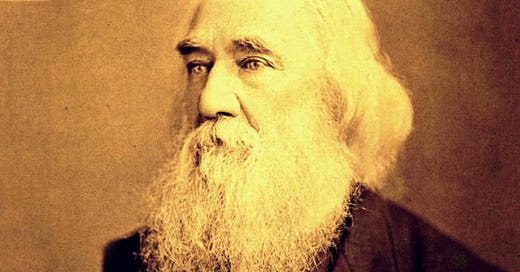What I’m Reading:
After yesterday’s post about Spooner’s perspective on voting, I returned to Spooner’s Natural Law, The Science Of Justice. Thankfully, I discovered this essay while researching John Locke and natural law during my senior year of high school for my honors civics class.
Our class was preparing for the Center for Civic Education’s We The People National Competitions in DC, and this was the essay that helped build much of the framework for my arguments regarding natural law.
In one of our presentations at the competition, I opened up with this quote, which you’ll also find in the passage I’ve attached below: “[Natural Law] is the science which alone can tell us on what conditions mankind can live in peace.”
Following this quote, Spooner systematically constructs a proto-libertarian natural law theory that very much coheres with Murray Rothbard’s Non-Aggression Axiom.
Below are the first few paragraphs of Natural Law, The Science Of Justice (1882).
The science of mine and thine -the science of justice- is the science of all human rights; of all a man's rights of person and property; of all his rights to life, liberty, and the pursuit of happiness.
It is the science which alone can tell any man what he can, and cannot, do; what he can, and cannot have; what he can, and cannot, say, without infringing the rights of any other person.
It is the science of peace; and the only science of peace; since it is the science which alone can tell us on what conditions mankind can live in peace, or ought to live in peace, with each other.
These conditions are simply these: viz., first, that each man shall do, towards every other, all that justice requires him to do; as, for example, that he shall pay his debts. that he shall return borrowed or stolen property to its owner, and that he shall make reparation for any injury he may have done to the person or property of another.
The second condition is, that each man shall abstain from doing to another, anything which justice forbids him to do; as, for example, that he shall abstain from committing theft, robbery, arson, murder, or any other crime against the person or property of another.
So long as these conditions are fulfilled, men are at peace, and ought to remain at peace, with each other. But when either of these conditions is violated, men are at war. And they must necessarily remain at war until justice is re-established.
Through all time, so far as history informs us, wherever mankind have attempted to live in peace with each other, both the natural instincts, and the collective wisdom of the human race, have acknowledged and prescribed, as an indispensable condition, obedience to this one only universal obligation: viz., that each should live honestly towards every other.
The ancient maxim makes the sum of a man's legal duty to his fellow men to be simply this: “To live honestly, to hurt no one, to give every one his due."
This entire maxim is really expressed in the single words, to live honestly; since to live honestly is to hurt no one, and give to every one his due.


